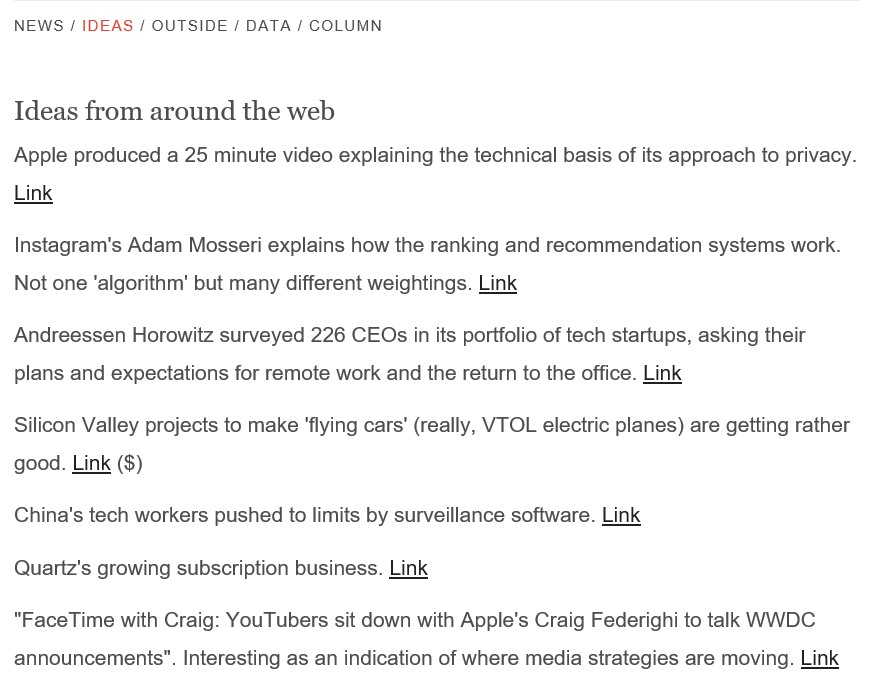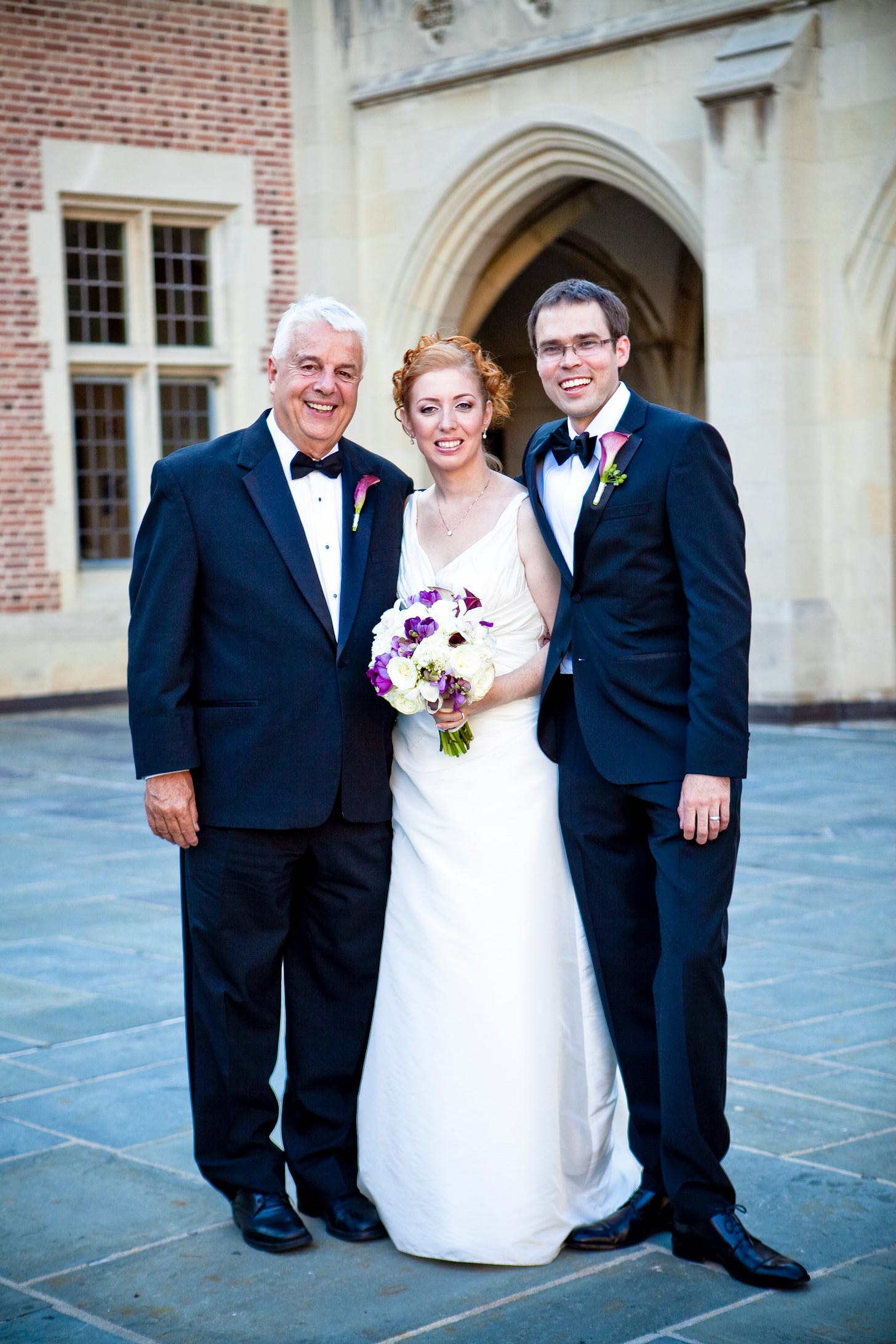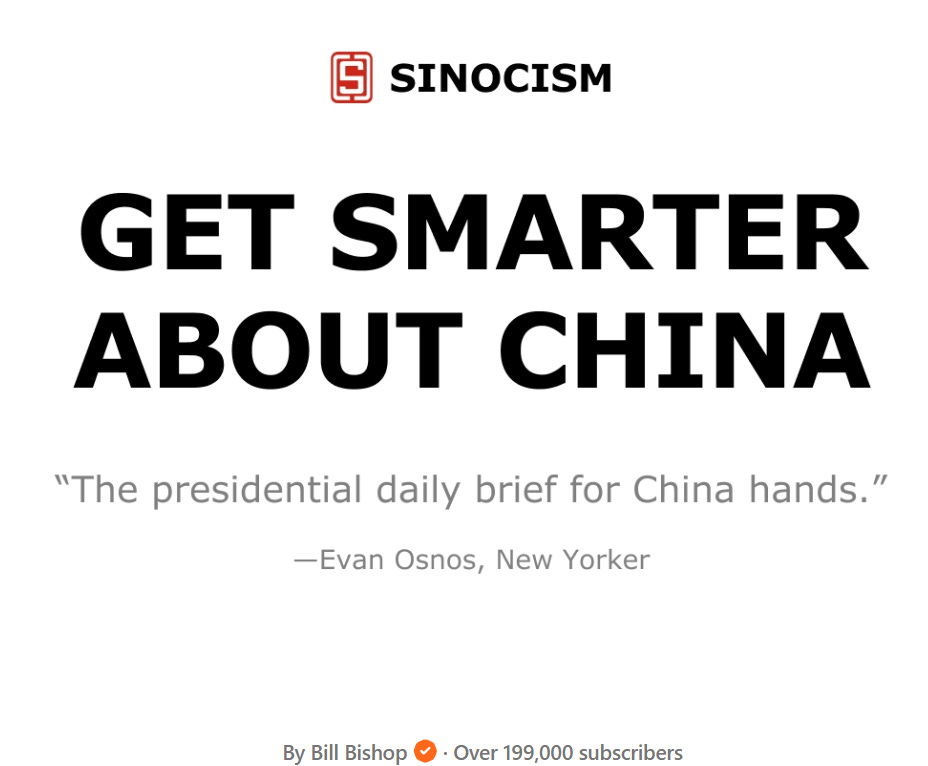My Information Diet - 2024
Staying info-nutritious: Recs for news outlets, analysis, podcasts, and newsletter subscriptions from an information junkie
👋 Hi there! Adam here. It’s been three years since I updated my Info Diet post, so here’s a run down for what a VP of Product in big tech does to keep updated on the world and our industry.
Do you know someone graduating and entering the workforce? Consider a forward and share with a few of your own recs thrown in!
P.S. If this got forwarded to you and you want to subscribe for free to see our weekly posts on career & product making, I’ll make it easy for you:
When I graduated college over a decade and a half ago, I got many pieces of advice from elders. A memorable one was from Dr. Rick Tuttle, a student leadership advisor to both Helen and me and it was this: Subscribe to The Economist magazine.
The Economist’s approach to journalism has stayed with me throughout my career: a global perspective catering to world leaders that incorporates history, long-form analysis, and data journalism.
So, it was a gift that Dr. Tuttle gave Helen and me, although I suppose it wasn’t the greatest one – as he did end up officiating our wedding several years later:
Consuming news, analysis, and information has been both a habit and a hobby. It’s been one of the most important career enablers in my job because it’s provided me with the broader context I’ve needed to make career decisions. Consuming information – about the world, my industry, and my profession – is how I develop intuition, something my organization prioritizes as I get more senior in my career.
So, whether you are a new grad looking to develop habits or just looking for a few content recs, here’s my own blueprint of the information I consume on a weekly basis. Call it my Information Diet and I included tips on staying info-nutritious in an increasingly info-junk world.
Industry News & Analysis
It’s part of my job to stay updated with what’s going on in my industry. If you are a new graduate, making this a part of your weekly habits can accelerate your early career and differentiate you.
I’ve tried industry periodicals over the years but found them too surface level. My steady state here has been a useful content aggregator that can find the best piece on any given news event + key sovereign analysts:
TechMeme. This is the one news aggregator I’ve let into my Information Diet. It’s curated by humans but with little original content of its own – it features breaking news updates on the latest in my industry. It’s widely recognized in the industry and my company’s PR teams cite how high a media push was on the site in their recaps.
Acquired.fm. “Every company has a story.” Ben Gilbert and David Rosenthal run a fantastic podcast that recounts the founders’ stories and strategy for major firms in our industry. The histories of Airbnb, Sequoia, TSMC and Pinduoduo have been my favorites. David was recently interviewed by the Wall Street Journal where he made the point that corporations’ origin stories are the best nonfiction stories of our day - it our generation’s hero tales.
Benedict Evans. Benedict is a fantastic author with a succinct and sardonic writing style and content that is a mix of news summary + analysis. He has a weekly free newsletter with hundreds of thousands of subscribers with the stated topic of “what happened in tech that actually mattered, and what it means” and his paid newsletter is one of my favorite weekly reads.

Stratechery by Ben Thompson. A taste maker for our industry, Ben is one of the first sovereign authors before that was a term of art. He’s managed to democratize (and monetize) what would ordinarily be a tech company’s in house strategy department’s work, and he’s used his influence to score great interviews and insider news.

Last Week in AI. While I mainly get my AI news from sources internal to my company, I have found this newsletter a great skim to ensure I’m not missing anything in the AI arena.
My Professional Skills: Product Management
This was the biggest hole in my early-in-career information strategy. I just didn’t appreciate how much wealth of insights there was by reading up on the skills of my profession, separate from my industry. And wow has this area matured and consolidated in the past few years!
Lenny’s Newsletter & Podcast: Lenny’s work is now known as one of the most popular product management newsletters. His content is targeted to those who like to skim vs. read in depth, and the content is so high level that it’s geared towards those new to the industry. His podcast series has interviewed the biggest names in our industry, and it is a source of great wisdom.
Peter Yang’s Creator Economy Newsletter: Peter’s my second favorite PM influencer after Lenny. Good practical advice on product and career.
Deb Liu’s Perspectives: Former Facebook Product Executive and now a CEO, she often covers the more human elements of being a tech professional. Her post on what a Growth team should focus on is my favorite.
Sam Shillace’s Sundays Newsletter: A founder of Google Docs now at Microsoft, I find Sam’s informal ruminations on product making inspirational.
I sometimes follow John Cutler’s Beautiful Mess, Shreyas Doshi, and Will Lawrence’s Product Life but I find they have fallen behind Lenny. John and Shreyas also seem to do more click bait now a days by shaming anti-patterns; I miss the honest advice that fueled their early rise.
Great book recommendations are outside the scope of this post, but this section feels incomplete if I didn’t mention the work of Marty Cagan from Silicon Valley Product Group. His book Inspired is the #1 book I recommend to new product managers.
Leadership
I framed that an outcome of my Information Diet was to develop intuition, and intuition on influencing people, building coalition, and storytelling is a large part of most knowledge worker jobs. Here’s a few recs in that area:
Finding Mastery Podcast by Michael Gervais. A sports psychologist interviews leaders, mostly sports coaches but not always, about high performance and being in the flow. Gervais is a fantastic interviewer who gets people to open up about their personal struggles yet synthesizes how to apply it to the life of his listeners.
Brené Brown’s Dare to Lead Podcast. If you’ve subscribed to Mind the Beet for a while, you know our philosophy on leadership is rooted in allyship and vulnerability. Brené is the public face of vulnerability.
The Moth Storytelling Podcast. The Moth is an organization dedicated to the craft of storytelling and their podcast features the best of their “story slams” – true stories told live without notes to an audience. Not only are the stories fantastic, but it inspires clarity in communication in my own work life.
Journalism
So far, I’ve talked about how to be a knowledgeable information worker, using examples of my profession and industry (tech and product management). In addition, my information diet hobby involves consuming news and staying up to date as a citizen of the world.
My approach to journalism may seem obvious (I essentially recommend the most well known and commercially successful journalistic entities in the world) - but that’s the point and there is an intentional philosophy around this, namely that I a) avoid infotainment, TV, social media and AI-based aggregators as sources of news b) prioritize the highest quality journalism c) find a counterbalance to whatever is my primary source and d) support local news. I don’t have a problem with quality organizations being gatekeepers – in fact, I pay a premium for that synthesis. Here are some details:
The New York Times. It’s clear to me that the NYT is one of the few journalism organizations to cross the chasm to a new economic model and is pouring the profit into redefining quality journalism. This fantastic analyst report delves just into how the organization has transformed itself and how they prioritize paying journalists.

Wall Street Journal. The NYT has a bias for David over Goliath and stories that prioritize those marginalized by the system. WSJ is a great complement to the NYT in this respect. Both are pretty centrist overall and that is my goal; I want to support quality journalism vs. extremes.
Seattle Times. I make it a point to prioritize news of my local community. Like many, I’ve noticed the steep decline in quality for local news compared to just a decade ago – but keeping up with local news makes me a more interesting conversationalist with fellow parents and neighbors.
TikTok. My TikTok feed includes late night TV show snippets, SNL recaps, dad jokes, sports highlights, and breaking news from the major organizations. I find TikTok is often where I will hear about a breaking event first, before then diving into it with mainstream media.
ChinaTalk & Sinocism. These are two Substacks that cover in depth analysis of China, which was a 2023 goal of mine to increase my info diet on.
World Context
Long Now Foundation Podcast. The Long Now foundation seeks to counterbalance traditional thinking with interesting talks and projects focused on the 10,000 year time horizon. I find it a fantastic way of broadening my thinking on culture, product, and government.
Lex Friedman’s Podcast. “Conversations about the nature of intelligence, consciousness, love, and power.” From world leaders to tech CEOs, almost every major figure in the world has done a long form interview with Lex. He’s known as a friendly interviewer with softball questions - almost never challenging the people he interviews. Yet the soft style often brings out some unique insights.
The Economist, including their podcast spinoffs. I opened with The Economist, so you know it’s a primary source of data journalism, world context, and news analysis for me. Their podcast spinoffs - from Boss Class which dives into management theory to The Prince which covers the history of President Xi of China - are good deeper insights.
Life Hacks & Parenthood
Part of my info diet is ensuring a steady stream of “new things” into my life - here’s a few ways I do that:
Omar Knows. Omar’s recs on products he loves are aligned to my lifestyle - Helen and I buy nearly one of everything he recommends.
Recommendo. Cool stuff, once a week. Eclectic mix across nearly everything across digital and physical products. I often pick up something random to try.
New Fatherhood. Building community around fatherhood with a frank and vulnerable discussion of being a father.
In Closing
The trick is not to get overwhelmed. I have busy weeks where I get to little of the above content – and I always have a queue I feel slightly guilty about. Regardless of whether you plan to make this a small or large part of your time, I do encourage new grads entering the workforce to plan their Information Diet. Not only is it a career accelerator, but most jobs require you to get great at quickly consuming the right information and this is a way to build the muscle.






Excellent. Great post. Great information and wonderful context. so helpful!